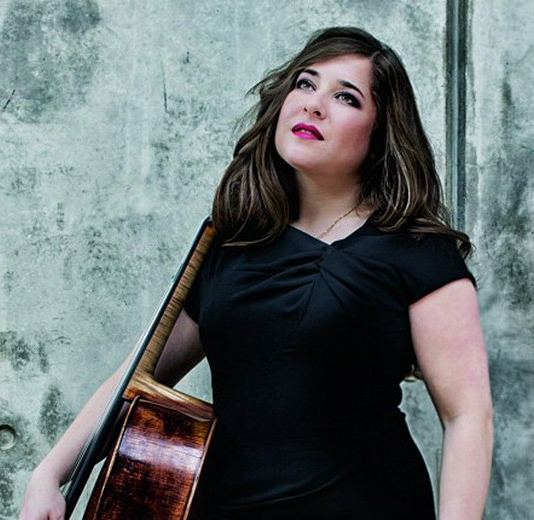Strong playing undone by fatigue in Weilerstein’s Bach marathon

Alisa Weilerstein performed Bach’s complete cello suites Saturday at 92Y.
It’s a shame that the 92nd Street Y isn’t thought of in the same category as the various venues between 57th and 70th Streets on the West Side. Though it doesn’t have quite the glamorous reputation of Carnegie Hall or Alice Tully Hall, the cultural center’s recital programming is some of the strongest in the city, offering A-list performers in exciting programs.
A prime example was Saturday night’s performance by Alisa Weilerstein of the complete Bach Suites for Solo Cello. A 2011 MacArthur “genius grant” Fellowship recipient, Weilerstein has established herself as the leading cellist of her generation, and the prospect of hearing her play such towering repertoire was enticing, to say the least.
Her playing in the early going was extremely promising. Performed in numerical order, the Bach cello marathon will always begin with the Prelude of the G-major Suite, perhaps the single most familiar movement of the entire set. Weilerstein’s approach to the touchstone work was gorgeously free, tugging on the bottom of many of the arpeggios without letting her playing become formulaic. In this suite, as in much of the music on Saturday, she often dropped to a pianissimo, drawing the listener closer for an intimate experience of the music.
Often, as in the G-major Allemande, her basic approach was to glide gently through the musical line, so that when she let the music swell it resulted in moments of hyper-focused intensity. She brought rustic flair to the suite’s two menuets, and showed in the Gigue a willingness to embrace the rougher side of the music, digging into the string to find its boisterous core.
The suite in D major showed tense, searing focus in the wanderings of the Prelude, and Weilerstein ended the otherwise placid Allemande with a surprising roar. This ability to find and portray stark contrasts of character within a single movement was one of the strongest features of Weilerstein’s playing on Saturday. She took an aggressive pace in the Courante, pressing her tone and her tempo right up against the edge of manic. The jewel of this suite is its Sarabande, which Weilerstein played with a soft heat, always gently simmering, even in moments of stillness.
Alas, much of her playing thereafter failed to measure up to the standard she set early on. The C-major suite was oddly matter-of-fact at its start, while the rest of the suite mixed moments of brilliance with wavering technique. The Allemande was cheeky and playfully preening, with a sort of self-mocking pretension. After an uneven Courante, where Weilerstein’s nerves seemed to be getting the better of her, she gave an especially sprightly rendition of the two Bourées and finished the suite with a jovial account of the Gigue.
The real trouble came in the Suite in E-flat: In the Prelude her tone was oddly dry, and her skewing of phrase after phrase began to feel like a tic. She found moments of almost unbearable poignancy in the Sarabande, but rushed through the two Bourées, undercutting the reserved nobility she was otherwise projecting in the music. The Gigue was nearly a total wreck, as she lost her focus and and her fingers, missing a couple of passages and speeding through the rest. She appeared to be tiring physically as her runs began to blur together, and she tripped over tricky passagework.
The C-minor suite showed a slight recovery, beginning with a stately, sober Prelude, deeply emotional but totally assured. The Sarabande was positively spellbinding, played almost straight, and in the thoughtful simplicity of the music — single notes as opposed to the chord clusters in the Sarabandes of other suites — Weilerstein communicated a deep, soulful grief.
The unsteadiness returned in the final suite, in D-major, with Weilerstein showing flashes of greatness but seeming to dash to the end. The Prelude, though technically treacherous, ought to be radiantly pure, but was marred by imperfections, crunched notes and iffy intonation. The best playing in this suite was in its Allemande, where a thin fog over her playing gave it a kind of nostalgic haze — an obscured image of bliss. The Courante was messy, and poorly tuned chords detracted from the intensely loving playing in the Sarabande.
Weilerstein at her best on Saturday showed why she is among our most revered cellists. Yet on the whole this recital called into question the wisdom of anyone trying to play all six of these suites in one sitting.







Posted Apr 27, 2017 at 3:09 pm by JH
I was at this concert and disagree completely with your account. It sounds like you have some kind of personal vendetta with how histrionic your “reviewing” is. Also, how you can you be trusted, when you can’t manage to edit your own “review”- you’ve many misspellings and errors, including the performer’s name.
You should give up, you fail. Reviewing isn’t about trying to make yourself sound smarter by attempting to destroy a performer.